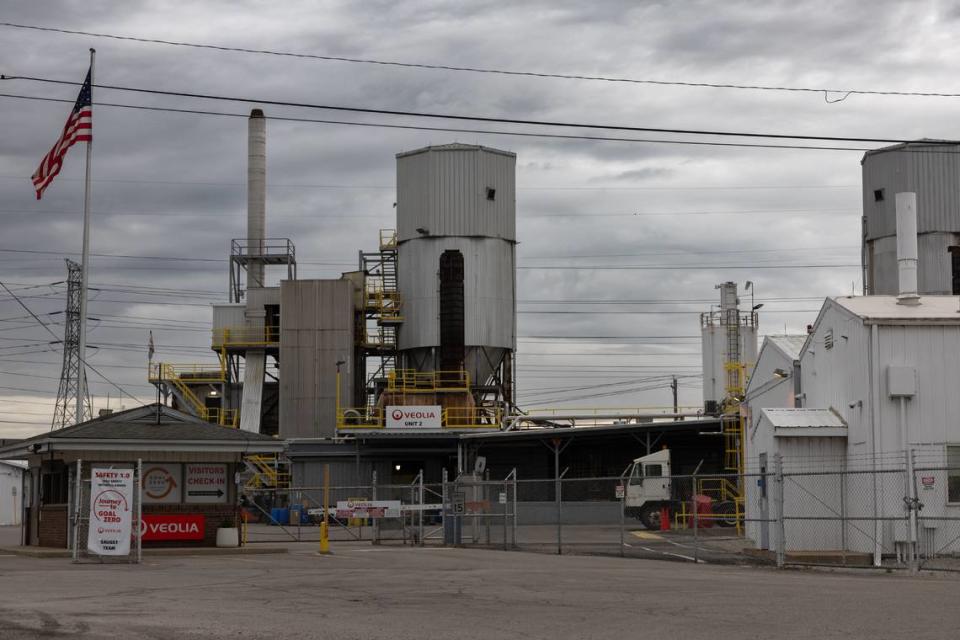Lawmaker asked CDC to study public health near Sauget years ago. What’s the status?
- Oops!Something went wrong.Please try again later.
In Reality Check stories, BND journalists dig deeper into questions over facts, consequences and accountability. Read more. Story idea? newsroom@bnd.com.
A federal health consultation looking at whether heavy metal emissions from a hazardous waste incineration facility in Sauget are poisoning local residents is still underway more than four years after a U.S. senator from Illinois requested it.
In October 2019, U.S. Sen. Tammy Duckworth sent a letter to the Agency for Toxic Substances and Disease Registry within the Centers for Disease Control and Prevention asking it to conduct a health consultation to determine if metal emissions from Veolia ES Technical Solutions’ facility are affecting the surrounding community’s health.
Duckworth’s request came shortly after the Illinois Environmental Protection Agency issued Veolia its Clean Air Act operating renewal permit, which removed the requirement for multi-metals emissions monitoring that was included in an earlier version. Veolia is now beginning its next permit renewal.
Metro-east residents want to know hazards of incinerator before EPA renews permit
The Agency for Toxic Substances and Disease Registry announced a month after Duckworth sent the letter that it would conduct the consultation, but later reported it did not have the data it needed.
“In response to my request, ATSDR discovered there was ‘no recent air sampling data for metals that was collected in or near the communities close to the facility,’” Duckworth wrote in a January 2021 letter to the U.S. EPA requesting that it install multi-metal emissions monitoring at Veolia’s facility.
The lack of recent data meant the Agency for Toxic Substances and Disease Registry could not determine the concentration of metals people are inhaling or related health risks.
“This is deeply troubling,” Duckworth wrote.
The EPA conducted an air monitoring study near the Sauget facility from June 2021 to March 2022 to gather the data.
The office of communications for the Agency for Toxic Substances and Disease Registry said in an email that it began working on the health consultation during the latter part of 2022 after receiving data from the EPA and that analysis is ongoing.
Duckworth’s Illinois Communications Manager Courtney Jacquin McManus said in an email that the health consultation is still undergoing scientific review and is expected to be released later in the year.
“Senator Duckworth and her office have continued to push for more answers and eagerly await these long-overdue results,” Jacquin McManus wrote.
According to the EPA’s website, its study involved two air monitoring trailers near the Veolia facility: one to measure the concentrations of various metals on an hourly basis and another to measure different types of mercury.
Based on the concentrations collected and analyzed, the “monitors did not record any values above levels expected to cause health impacts for people living near Veolia.”
To reach that conclusion, the EPA compared the results to current health benchmarks and found that the concentrations of metals were below both the short- and long-term benchmarks.
However, “there were a handful of 1-hour periods when concentrations of arsenic, antimony, total chromium, lead, nickel, divalent mercury, and particulate mercury increased.”
The EPA is investigating those increases in addition to its ongoing investigation following a finding issued in September 2021 that Veolia was violating “various air pollution control regulations,” including its Clean Air Act operating permit.
The Agency for Toxic Substances and Disease Registry’s health consultation will be more in-depth than the EPA’s analysis.
Cahokia Heights public health assessment
More recently, lawmakers requested the Agency for Toxic Substances and Disease Registry get involved in the metro-east for the second time in recent years.
Last December, U.S. Sens. Dick Durbin and Tammy Duckworth and U.S. Rep. Nikki Budzinski asked the agency to conduct a public health assessment in Cahokia Heights, where residents have been subjected to decades of flooding and sewage backups into their yards and homes.
At the beginning of April, however, Durbin and Budzinski told the BND they still had not received confirmation that the agency would perform the assessment and that they continue to follow up to ensure it happens.
Health consultations like the one currently underway near Veolia’s facility in Sauget are different from public health assessments like the one lawmakers have requested in Cahokia Heights.
According to the Agency for Toxic Substances and Disease Registry’s website, public health assessments look at various exposure situations and community health concerns while health consultations focus on one public health issue or question, contaminant or technical interpretation.


